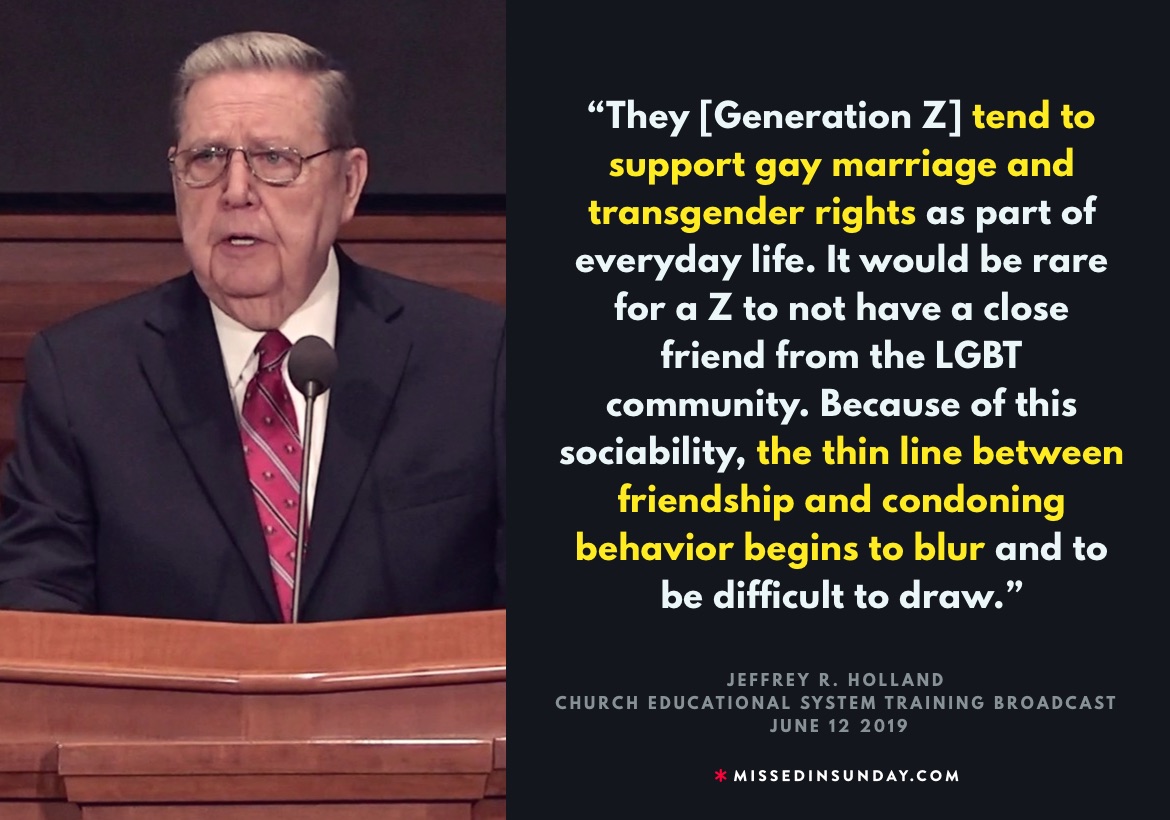Excerpt from a June 12 2019 Church Educational System Training Broadcast. Talk by Jeffrey R. Holland, ‘Angels and Astonishment’: 1
As the world becomes increasingly secular, we must learn how to be ever more helpful and exemplary for our young men and women who have to defend their faith while living in a culture that often denies it or, worse yet, demeans it. The gap between our faithful young people and the sometimes-antagonistic world around them is, at least as an overall generalization, widening with every passing day. That is, of course, “a given” in the prophecies of the latter days, but that doesn’t make it any more pleasant to address nor any more fun to face. In this little summary of the world, our students are endearingly referred to as Generation Z because of certain characteristcs. These characteristics highlight some of our challenges in teaching:2
They are always wired to something. “They’ve never known a world without the internet, or cell phones [or ear buds]. … Google has always existed [for them].” They may never have seen a rotary dial telephone or made a call from something called a booth. But that’s okay because this group prefers to text anyway.
Through this ubiquitous electronic network, they have been exposed to flagrant, destructive pornography at very, very early ages.
They tend to “[support] gay marriage and transgender rights … [as] part of everyday life. It would be rare for a Z to not have a [close] friend from the LGBT community.”4 Because of this sociability, the thin line between friendship and condoning behavior begins to blur and to be difficult to draw.
“They’re post-Christian. Almost a quarter,” (these are not our LDS students, but they are in fact the world that we’re looking at), “Almost a quarter (23 percent) of America’s adults—and a third of millennials—are ‘nones,’ claiming no religious identity at all. Many Zs are growing up in homes where there’s no religion whatsoever, [giving them] no experience [and no context for] religion [in their own lives].”
A recent study into Australian teens’ attitudes toward religion made headlines for its findings that 52 percent of them do not identify with any religion and only 37 percent believe in God.
Pastor and author James Emery White has written extensively on their spiritual circumstance. He said, “First, they are lost. They are not simply living in and being shaped by a post-Christian cultural context. They do not even have a memory of the gospel [or a gospel context]. The degree of spiritual illiteracy is simply stunning. … [Second], they are leaderless. Little if any direction is coming from their families, and even less from their attempts to access guidance from the internet.”
According to an article published in USA Today, Generation Z is the loneliest subgroup we have known in society. The article cited a 2010 BYU study that concluded (quote), “Loneliness has the same impact on mortality as smoking 15 cigarettes a day, making it even more dangerous than obesity.”
Around 53 percent of 13-year-old American girls are unhappy with their bodies. This number grows to 78 percent by the time girls reach 17, still ours. Over 50 percent of teen girls and 30 percent of teen boys use unhealthy weight-control behaviors such as skipping meals, fasting, smoking cigarettes, vomiting, and taking laxatives.
Lastly, they have short attention spans. Some report the average attention span for Zs is about eight seconds. I would have lost them in the first three bullets we have shown here.
Well, seminary and institute teachers are not going to solve all of these problems overnight, but the Brethren do look to you to be well-versed, well-prepared, spiritually in tune, and significantly able to address questions on these issues when they arise and to deal with them if you have to in real time. With your midweek contact, you are more accessible to students than almost all of the other teachers in the Church are able to be, so be wise in how you do it, but be certain that the Brethren do want and expect you to help—formally and informally, in class and out—in teaching the policies, and practices, and doctrines of the Church.
References
| 1 | ‘Angels and Astonishment’, June 12 2019 Church Educational System Training Broadcast, Jeffrey R. Holland – https://www.churchofjesuschrist.org/broadcasts/article/satellite-training-broadcast/2019/06/14holland |
|---|

